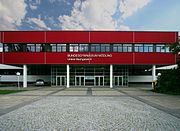BG Bachgasse Mödling
| BG Bachgasse Mödling | |
|---|---|
| type of school | AHS |
| founding | 1901 |
| address |
Untere Bachgasse 8 |
| place | Mödling |
| state | Lower Austria |
| Country | Austria |
| Coordinates | 48 ° 5 '4 " N , 16 ° 17' 59" E |
| student | approx. 1000 (as of 2017) |
| Teachers | 95 (as of 2017) |
| management | Reinhard Gogola |
| Website | www.bgmoedling-bach.ac.at |
The Bundesgymnasium Mödling Untere Bachgasse is an AHS in the Lower Austrian town of Mödling .
history
In 1899 a further education school for senior daughters was founded in Mödling's Kaiserin Elisabeth-Straße , which from 1901 was run as a private girls' college. This means that 1901 is considered the year the BG Bachgasse was founded. In 1904 the Lyceum was granted public rights. According to the plans of the architect and Otto Wagner student Sepp Hubatsch , a new Art Nouveau school building was built at Eisentorgasse 5 . The building was expanded and raised in the following years. In the school year 1934/1935 the branch of the Realgymnasium was introduced in addition to the already existing grammar school. In the 1970s, the school was considered the largest secondary school for girls in Lower Austria. At the beginning of the 1978/1979 school year, the company moved to a new building at Untere Bachgasse 8 , very close to Mödling train station. In the early 1980s, male pupils also attended the school for the first time, which, due to the large school kitchen, has now also been expanded to include the business school branch.
In the school years 1990/1991 and 1991/1992, two further selectable branches of school were introduced as school trials (see school types ): the so-called language high school and the economic high school with a biological / chemical focus ("Bio-Wiku"). At the beginning of the 2004/2005 school year, the school week was shortened from six to five days (Monday to Friday) according to a previous survey among students, teachers and parents.
School dates
Reinhard Gogola is the director.
Faculty
- Teaching staff: 95 (as of 2019)
- Interns: 2
- Assistants for English, French and Spanish
Pupils / classes
- Schoolchildren: 564 (of which 396 in the lower level and 168 in the upper level)
- Students: 356 (of which 271 in the lower grades and 85 in the upper grades)
- Classes: 40
subjects
- Languages: German, English, Spanish, French, Latin.
- Formal knowledge: mathematics, computer science
- Natural sciences: biology, physics, chemistry, biochemical internship (BCP), geography and household economics (HOE)
- Humanities: history, psychology (PuP), ethics and religion
- Art: BE, works, VDG, music, BuS
Educational offers
- Language grammar school (school experiment): The timetable for this school experiment is the same as that of the grammar school, with the exception that in the 7th grade , French is taught instead of Latin . Furthermore, another foreign language must be chosen in the 9th grade.
- Wirtschaftskundliches Realgymnasium with an ecological focus (school trial): This special form of the Wirtschaftskundliches Realgymnasium can be chosen in the 9th grade. This school experiment focuses on the natural sciences and ecology, including practical exercises on biology and chemistry in the afternoons (these can also be chosen as part of a teaching experiment in the third and fourth grades). In addition, the number of hours per week in natural science subjects is higher and chemistry is taught a year earlier than in normal high schools.
- Wirtschaftskundliches Realgymnasium with a geographical and graphic focus: This special form of the WIKU (WIrtschaftsKUndliches Realgymnasium) can be chosen in the 9th grade. In this branch, computer science and geography are in the foreground.
Choices
- Elective subjects: In the 10th, 11th and 12th grade, a certain number of elective subjects (this depends on the chosen school type) must be added to the compulsory compulsory subjects. A total of 22 courses are offered, divided into supplementary and in- depth elective subjects. These also include preparatory courses for the Cambridge Certificate . These items are graded like all others and it is also possible to have to repeat the year in one of these subjects due to the grade “insufficient”.
- Optional subjects: These can be chosen independently of the school level currently being attended and mainly include talent development. They are also graded, but it is not possible to have to repeat the year by saying “insufficient” in one of these subjects.
- Non-binding exercises: In addition to the regular lessons, non-binding exercises are held in the afternoon units. The offer ranges from various sports and music lessons to introductions to the basics of computer science. The achievements in non-binding exercises are not graded, only a note appears on the certificate that the student took part in it.
- Bachgassenakademie: Qualified course leaders or teachers put together courses from the standard curriculum.
Individual evidence
- ↑ Stadtgemeinde Mödling, urban renewal work group (ed.): Mödling - history, houses, people . Things worth seeing and knowing from the present and the past. Youth and People, Mödling 2010 ( Mödling - history, houses, people [PDF]).
- ^ Theresia Hauenfels: House of Youth Mödling. Retrieved March 2, 2018 .

